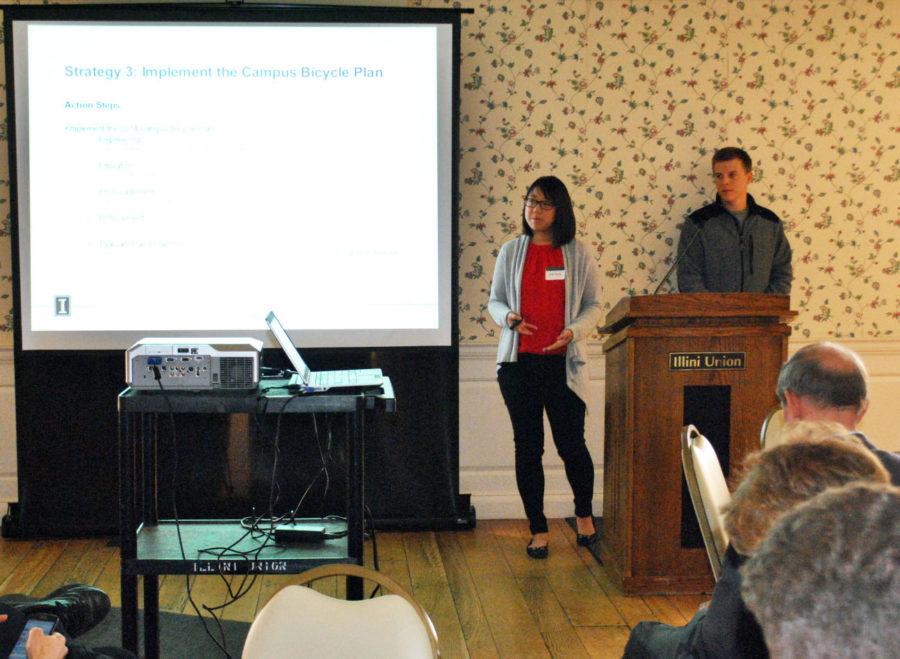iCAP holds forum regarding revision process
Grace Kyung and Justin Licke discuss their third strategy in reducing greenhouse gas emissions at the iCAP Forum Wednesday.
October 23, 2014
The Illinois Climate Action Plan held a public forum Wednesday regarding its current revision process, which happens every five years.
Initiated in May 2010, iCAP is a collection of research that serves guidelines for how the campus will achieve carbon neutrality by 2050.
Sustainability Working Advisory Teams, or SWATeams, addressed the progress on objectives, strategies and positive initiatives. The six teams consisted of students, faculty and staff.
The forum began with a presentation from the Agriculture, Land Use, Food and Sequestration SWATeam, which focuses on producing fewer agricultural impacts. The team wants to examine a way to transform agricultural waste to improve soil productivity and sequester carbon.
Two other examples of SWATeams include the Water SWATeam, which emphasizes water conservation, and the Transportation SWATeam, which provided strategies to reduce carbon emissions, like charging stations for electric-powered vehicles.
Get The Daily Illini in your inbox!
Warren Lavey, adjunct assistant professor in Natural Resources and Environmental Science, spoke as a director of the Purchasing, Waste and Recycling SWATeam. He discussed recent initiatives, such as adding recycling bins on the Quad, executing studies on waste streams in four buildings and using EnviroPure digesters in dining halls to aid in composting food waste.
Lavey mentioned that the team has achieved its target of increasing the University’s waste diversion rate to 75 percent by 2020; the rate hit 84.5 percent in 2012. But he also said the road to zero-waste is not going well because the University is falling short of leadership, a lack of recycling bins and weak incentives for campus units to reduce consumption.
Specifically, he cited the fact that campus units are not accountable for waste or recycling, and there is no recycling for many plastics and glass.
His group came up with revisions that include reducing campus purchases, expanding the range of categories for waste measurement and increasing the effectiveness of sorting recyclable wastes.
The Energy Conservation and Building Standards SWATeam emphasized the importance for the University to get ground source heat pump geothermal systems, which are central heating and cooling systems that transfer heat from the ground by using the earth as an energy resource.
The forum ended with a ceremony for Energy Conservation Incentive Program awards, given to eight facilities on campus that showed a high percentage of energy conservation in 2014.
The purpose of SWATeams is to make recommendations for new iCAP policies and initiatives. These recommendations will be sent to an iCAP Working Group, who will evaluate the recommendations and give feedback. These evaluated recommendations will then be approved, modified or rejected by the Sustainability Council.
Revision drafts were due Wednesday and the aim is to ultimately have the changes signed by Chancellor Phyllis Wise in April 2015, during Earth Week.
Ben McCall, associate director of iCAP and professor in Chemistry, emphasized the importance of participation of members of the University in the revision process.
“It’s important to know that this process is not only driven by a group of administrators, but also driven by groups of students and faculties. The iCAP revision process is a great collaboration between all these groups,” McCall said. “It’s not going to be easy to bring all these people together, but community’s participation in this process is a recipe for success on iCAP revision process.”
Suyeon can be reached at [email protected].







